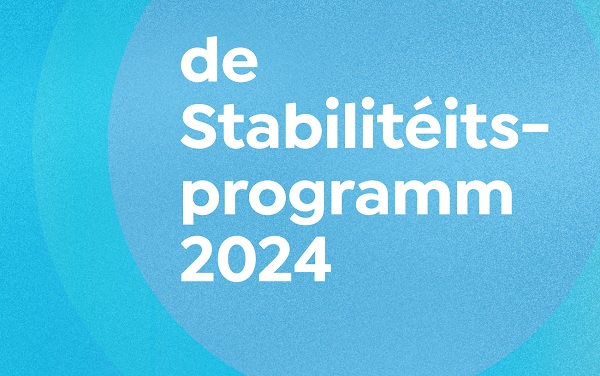 Luxembourg Stability and Growth Programme (2024);
Credit: MFIN
Luxembourg Stability and Growth Programme (2024);
Credit: MFIN
On Thursday 25 April 2024, the Luxembourg government transmitted its Stability and Growth Programme and National Reform Programme for 2024 to the European Commission and the Council of the European Union.
As reported by Luxembourg's Ministry of Finance and the Ministry of the Economy, this approach is part of the European Semester, a cycle of coordination of economic, budgetary, social and labour policies within the EU.
The two programmes were the subject of a presentation to the social partners on 15 April 2024, jointly by the Minister of Finance, Gilles Roth, and the Minister of the Economy, SMEs, Energy and Tourism, Lex Delles, in the presence of Prime Minister Luc Frieden. The programmes were also presented as part of the budgetary debates in the Chamber of Deputies (Luxembourg's parliament), which were held from 23 to 25 April 2024.
The ministries clarified that the Stability and Growth Programme data for the period under review are entirely based on those presented in the draft state budget for 2024.
In a context of economic crisis, noted the ministries, the public administration balance amounted to -0.7% of GDP in 2023. Despite efforts to contain government spending growth, the public administration balance is expected to reach a deficit of 1.2% of GDP, an improvement of 1.5 percentage points compared to the data presented in autumn 2023. The deficit is expected to reduce in the medium term and drop to -0.9% of GDP from 2026. Public debt is expected to stand at around 26.5% of GDP in 2024, before stabilising around 27% of GDP.
The National Reform Programme describes the range of national strategies aimed at laying the foundations for the green, digital and inclusive transition in view of the challenges facing the country. It includes a chapter concerning the current state of the implementation of reforms and investments included in the framework of the national Recovery and Resilience Plan, prepared by the Ministry of Finance. In addition, this programme brings together information concerning reform or investment projects and political responses to the major economic, social and employment challenges identified within the framework of the 2023-2024 country specific recommendations.
In view of the adoption of the reform of EU budgetary rules by the European Parliament, these are the last such programmes in their current form.








